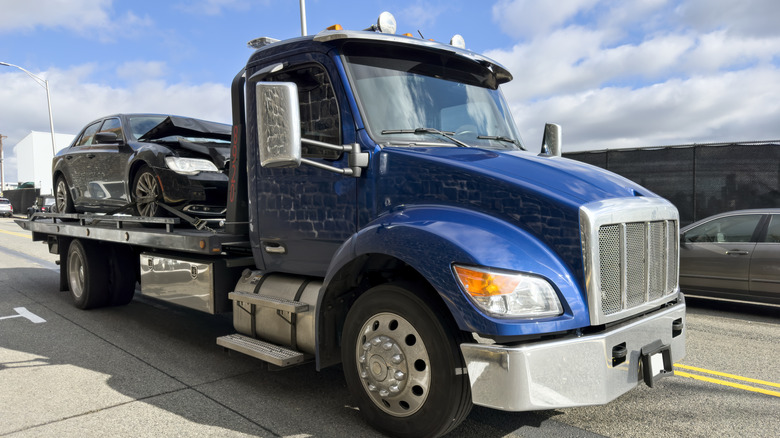Why Do Tow Trucks Have 'Not For Hire' Signs?
Ever noticed a "not for hire" sign plastered on the side or rear of tow trucks and wondered what it means? Its purpose is actually to inform the public that the vehicle does not operate for business purposes. Such trucks are likely owned and operated by business entities transporting their own goods, say a construction firm transporting materials or a car dealership delivering new vehicles to its lot. As such, while the transport serves a business purpose, the service itself is not provided for public use.
The Code of Federal Regulations (CFR) defines a for-hire motor carrier as a person or entity that transports goods or passengers in exchange for compensation. On the contrary, a private motor carrier performs similar transport activities but without receiving payment. In a separate definition for private motor carrier of passengers for business, the CFR notes that services provided are "not available to the public at large." Therefore, in this context, compensation or payment refers to money given by external clients.
Though the definitions explain what the two motor carrier types are, they fail to expound on their technical differences. Aside from not mentioning that the definitions directly apply to the vehicles the carriers operate, the CFR does not explicitly say how for-hire trucks are required to secure operating authority or a license from the Federal Motor Carrier Safety Administration (FMCSA). Private motor carriers are not required to do the same, but must still comply with safety standards, such as truck maintenance inspections and more.
Other differences between for-hire and not-for-hire trucks
There are many other distinctions between for-hire and private trucks. At face value, the "not for hire" sticker makes it easier for the Department of Transportation (DOT) officers and other authorities to quickly determine the applicable set of rules for a towing vehicle crossing state lines. Since not-for-hire, or private, trucks do not engage in commercial operations, they are generally subject to less stringent regulatory oversight than their for-hire counterparts.
However, a few states actually adopt a more lenient approach to enforcing regulations on not-for-hire towing vehicles. One of them is Indiana, where a driver operating a private motor carrier within the state is only required to hold a commercial driver's license (CDL) if the combined weight of the towing truck and the towed vehicle exceeds 26,000 pounds. On the other hand, for-hire carriers are obliged to have a CDL when their gross combined weight already exceeds 10,000 pounds. This is different from their payload and towing capacity.
Another key difference between the two motor carriers is insurance requirements. Private towing trucks are not required to maintain commercial auto liability insurance as long as they do not transport hazardous materials. This means their drivers are not liable for the cargo or the vehicles they transport in the event of an accident, since, technically speaking, they are only transporting property that belongs to the business owner. Only for-hire trucks are mandated to carry liability coverage as protection against financial losses in case of damage or injury during transport.
What the sign means for pedestrians
If you experience a roadside breakdown and a tow truck with a "not for hire" sign is nearby, you should not expect the driver to help you with your emergency. The sign is clearly there to indicate that the vehicle is solely used for internal purposes by the private entity that owns it. It is not authorized to provide commercial towing services to the public, and offering payment to the driver would not change this, since towing your car falls outside the truck's designated use.
Additionally, private towing vehicles typically do not display a phone number on their exterior for a reason. Commercial tow trucks are generally required to display their USDOT number (which unlike a Vehicle Identification Number, identifies the company, not the individual vehicle), company name, city of origin, and a contact number on the vehicle's body. Private tow trucks are allowed to forgo the city and phone number as long as they prominently display a "not for hire" sign for pedestrians to see.


